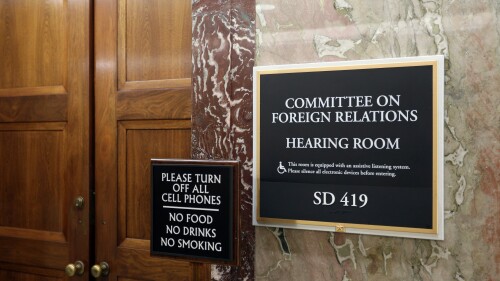America’s June 21 bombardment of Iranian nuclear facilities may have set the regime’s nuclear-weapons aspirations back by several years, but unless American policymakers press the advantage, the Islamic Republic will rebuild and survive to fight another day.
The Islamic Revolutionary Guard Corps and its regional proxies remain a threat to the United States and its allies. In the weeks since the Israeli-Iranian cease-fire, Iran and its proxies have executed near-daily drone strikes on Iraqi bases that house U.S. troops. Meanwhile, Iran’s stockpile of ballistic missiles, capable of penetrating Israeli air defenses in significant numbers, remains intact.
Fortunately, there’s a solution. By placing a package of legislative measures on the president’s desk, Congress can effectively neutralize Iran’s regime and help precipitate its collapse — without deploying ground troops or firing a single shot in anger. Legislation that codifies President Donald Trump’s “maximum pressure” policies into law, places sanctions on Iran’s energy sales, and designates the regime’s proxy armies as Foreign Terrorist Organizations will go a long way toward containing Iran’s regime and encouraging its downfall.
By placing a package of legislative measures on the president’s desk, Congress can effectively neutralize Iran’s regime and help precipitate its collapse — without deploying ground troops or firing a single shot in anger.
In another stroke of good fortune, Congress has already introduced much of the legislation needed to bring the ayatollah to his knees, and committee chairmen need only hold markup hearings to advance these bills and send them to the House and Senate floors.
The Republican Study Committee (RSC), a House GOP caucus driven by conservative principles, had the good sense to roll out a package of bills on April 1 that would weaken the Iranian regime, neutralize its proxies, and empower Iranian citizens. The committee’s “Enforcing Maximum Pressure: Holding Iran Accountable” initiative closes sanctions loopholes, liberates Iraq from Iran’s puppet militias, counters censorship of Iranian dissidents, and protects the U.S. and its allies from retaliatory attacks.
Sponsored by Representative Zach Nunn (R., Iowa), chairman of the RSC’s National Security Task Force, the Maximum Pressure Act is the flagship piece of legislation behind the committee’s initiative. First, this bill locks in President Trump’s “maximum pressure” sanctions framework, preventing subsequent administrations from reversing or waiving Iran sanctions as part of a nuclear deal. Inconsistent nonproliferation policies spanning multiple American presidential administrations helped set the stage for Iran’s defiance and U.S.-Israeli intervention. It’s time to end America’s bipolar containment strategy.
Second, the Maximum Pressure Act lays out fresh “sectoral sanctions” targeting Iranian steel, construction, mining, financial, and energy exports, along with strict property-blocking sanctions and financial penalties targeting people and entities involved in producing Iran’s ballistic missiles. Nunn’s 138-page bill is the most comprehensive and efficient legislative option for containing Iran’s terrorist regime.
It’s also the most difficult to shepherd through the House and Senate, thanks to the far-reaching scope of this legislation. Therefore, Congress members may have better luck with other commonsense bills found in the RSC’s legislative portfolio.
They should start with the HR 2614 — the Maximum Support Act. What the Iranian people truly need to overcome the regime is protection from the state security apparatus. The Maximum Support Act prioritizes internet freedom, providing secure Virtual Privacy Networks, satellite-to-cell technology, and anti-surveillance tools to bypass the regime’s censorship and blackouts. These tools enable activists and citizens to communicate securely and organize against a regime that employs facial recognition technology and AI-enhanced cameras to shut down protests before they form.
Congress must get to work dismantling Iran’s proxy army in Iraq. By sanctioning and designating a list of 29 Iran-backed Iraqi militias through Florida Representative Greg Steube’s Iranian Terror Prevention Act, the U.S. can shut down the Popular Mobilization Forces and other Shiite militias that are part of Iraq’s state military structures.
The bill also establishes a strikers’ fund, redirecting seized regime assets to support Iranian workers who walk off the job in protest. Additionally, it designates Iran’s Ministry of Intelligence and Security, the regime’s internal spy service, as a Foreign Terrorist Organization.
Next, Congress must get to work dismantling Iran’s proxy army in Iraq. By sanctioning and designating a list of 29 Iran-backed Iraqi militias through Florida Representative Greg Steube’s Iranian Terror Prevention Act, the U.S. can shut down the Popular Mobilization Forces and other Shiite militias that are part of Iraq’s state military structures. This includes groups like the Badr Organization and Kataib Hezbollah, which are part of Iranian-sponsored armed groups responsible for killing hundreds of American service members. Concurrently, South Carolina Representative Joe Wilson’s Free Iraq from Iran Act calls for cutting off funding to Iraq’s government unless “Iran backed puppet militias including the PMF are no longer part of the Ministry of Interior.”
Finally, the RSC’s sanctions legislation includes HR 2575 — the Iran Waiver Recissions Bill. This bill would rescind a Biden-era waiver concerning $6 billion in frozen Iranian assets transferred to Qatar in September 2023. Sponsored by Representative Brian Steil (R., Wis.), the No Sanctions Relief for Terrorists Act will shut down loopholes that could allow a president to provide sanctions relief to Iranian groups designated as terrorist organizations, such as through humanitarian waivers that indirectly benefit terrorists.
A renewed push to pass the RSC’s maximum-pressure legislation has yet to materialize. On the contrary, the only Iran-related legislation to advance to a floor vote since the U.S. strikes on Iran was a failed Senate bill designed to limit the president’s war powers and require congressional approval for even limited strikes against the Islamic Republic. It’s time to set partisanship aside, support the people of Iran, and crush Iran’s brutal and destructive regime.








